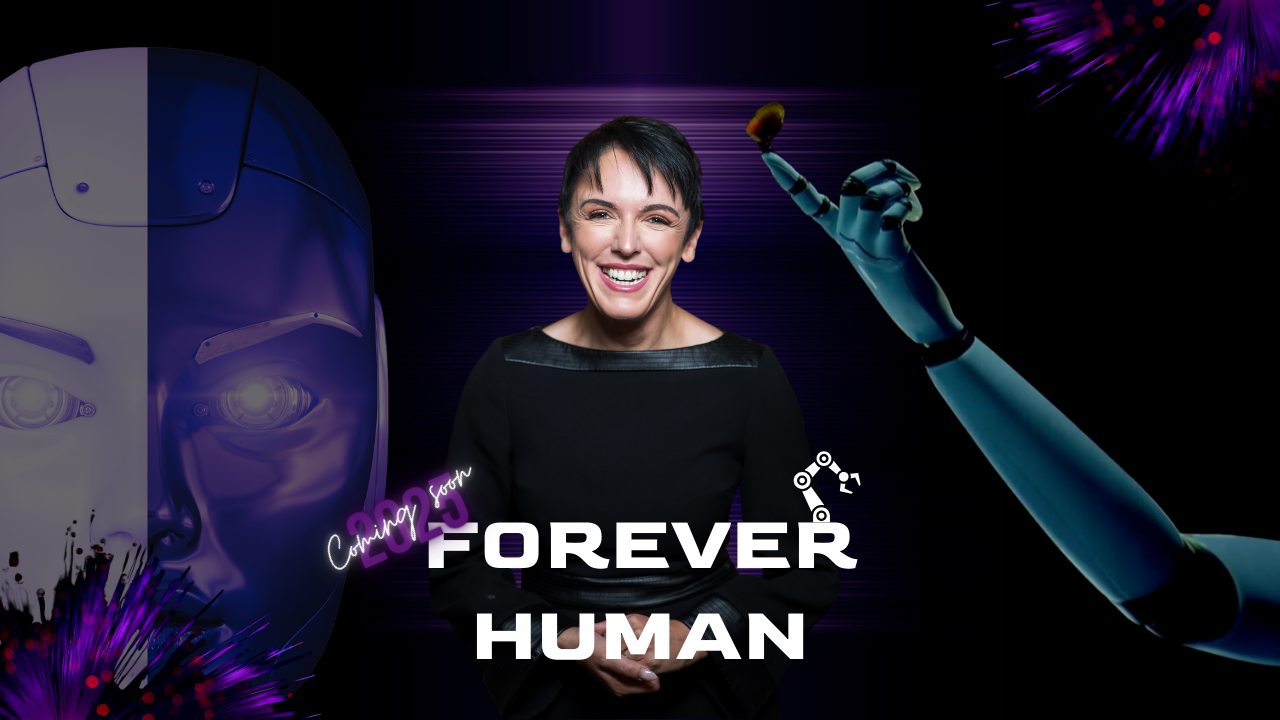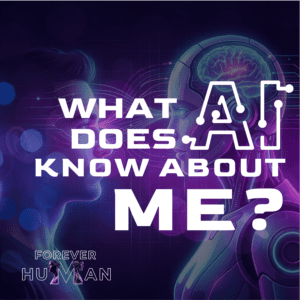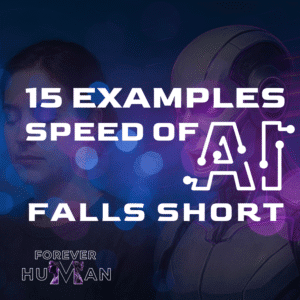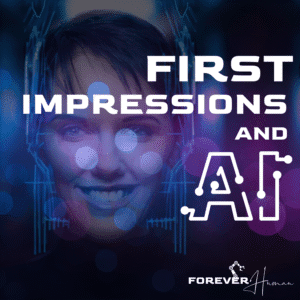Will AI Replace Jobs—Even Yours?
AI won’t replace you; handing over your irreplaceable human qualities will.

Let’s get one thing straight: If you use AI to replace you, it will replace you. AI is a tool, not a substitute for the uniquely human qualities we bring to our work. Unfortunately, many professionals are using AI in ways that might fast-track their own obsolescence. The key lies in understanding the balance—leveraging AI to enhance your role, not erase it.
KEY TAKEAWAYS
- Using AI to replace human tasks that require emotion, creativity, or authenticity can harm your professional relationships and credibility.
- Automating personal interactions, such as emails or social media messages, often leads to generic communication that lacks a genuine connection.
- Relying solely on AI for creativity, collaboration, or sales pitches can result in uninspired outcomes that fail to resonate with others.
- Delegating client check-ins or team communication to AI strips away the personal touch needed to build trust and rapport.
- Blindly following AI insights without applying human judgment can lead to decisions that overlook ethical, cultural, or emotional nuances.
- Allowing AI to craft your brand’s voice risks losing the unique tone, personality, and authenticity that connect with people.
Automating Your Emails will Replace You
Picture this: You receive an email from a colleague or client, and it’s painfully obvious it was AI-generated. The tone is stiff, the phrasing robotic, and it feels like the sender didn’t even try. How does that make you feel? Probably undervalued and disconnected.
I always cringe when I receive an email that is so obviously crafted by AI. It’s like being invited into a conversation that even the sender didn’t want to be truly part of in the first place. It subtly communicates, “I couldn’t be bothered to connect with you myself.” Between the lines, it screams disinterest, lack of effort, and a transactional mindset that can leave the recipient questioning their value in the relationship.
Now flip the script. If you’re using AI to craft all your emails—whether to a client, a team member, or a potential partner—it’s tempting to let AI handle the heavy lifting. But here’s the problem: A personal email that doesn’t feel personal can damage relationships rather than build them. AI can help you brainstorm or polish, but the heart of the message has to come from you. Otherwise, it’s moments like these that make people think, “Is this how AI will replace jobs—by turning meaningful communication into generic, lifeless exchanges?”
If you won’t invest effort in an email, why should your recipient invest time reacting on it?
Sylvie di Giusto
Auto-Connecting or Commenting on Social Media will replace you
Social media is where relationships begin—or fall apart. Yet, many professionals rely on AI to auto-connect, comment, or send messages filled with canned responses. The result? Generic, inauthentic interactions that practically scream, “I didn’t take the time to know you.” If you’re using AI this way, you might be contributing to the very scenario where AI replaces jobs that require genuine human connection.
I bet your LinkedIn inbox looks just like mine—daily uninvited, robotic messages. Either they’re painfully generic or so clearly unresearched that it’s almost laughable. I can’t count the number of times I’ve been asked if I’d like to fulfill my dream of becoming a speaker, or perhaps writing a book. As someone with decades of speaking experience and more than a dozen books, these messages don’t just miss the mark—they make me question if the sender even knows how to hit the target. Here’s an interesting read for you: The Hidden Costs of Automated Outreach.
Think about it: Would you trust someone who commented, “Great post!” or “Thanks for sharing!” or “I agree!” on your thoughtful article without adding anything meaningful? Or someone who leaves an overly generic response like, “This is so inspiring” on a post clearly about a niche, complex topic? These kinds of AI-generated interactions don’t just fall flat—they actively erode trust by showing a lack of effort and authenticity.
Using AI in this way not only fails to build relationships; it can actively harm your reputation. Social media is about showing up authentically, connecting with intention, and fostering genuine relationships. And no AI can replicate the power of your unique perspective and voice.
AI-generated online activities might save you time, but they’ll cost you trust; and ultimately relationships.
Sylvie di Giusto
Replacing Creative Tasks Entirely will replace you
Will AI replace jobs in creative fields? Only if we allow it to take over the heart and soul of what makes creatives’ work resonate. Creativity is a distinctly human trait, fueled by emotion, intuition, and lived experiences. When professionals use AI to completely replace creative tasks—like writing, designing, or brainstorming—they risk producing work that feels hollow. AI can be a fantastic partner for generating ideas or enhancing what you’ve already created, but it should never take over.
Here’s an example: I’m part of a community that connects podcast hosts with potential guests who can share their expertise on their shows. This week, I received an invitation to a fully AI-generated podcast. Intrigued, I listened to a few episodes only to discover that the “interviewer” was an AI-generated voice, robotically reading off pre-written questions. The episode descriptions were bland and repetitive, and even the accompanying imagery and video were fully AI-generated. What struck me most, though, was that it wasn’t even disclosed that the host wasn’t human. The podcast gave the impression that a real person was behind it, and when I realized that wasn’t the case, something in me felt… well… slightly offended.
Who is this meant to attract? Do listeners genuinely want to tune in to a conversation between a human guest and a lifeless AI host? Do experts want to share their stories with something incapable of empathy, curiosity, or meaningful engagement? It’s scenarios like this beg the question, “Will AI replace jobs because we are undervaluing the magic of human creativity?”
Creativity requires storytelling, empathy, and originality—qualities AI can mimic but not master. While AI has its place as a tool to support creativity, it will never replace the magic that comes from a truly human connection. Authenticity and transparency matter now more than ever, and when we lose those in our creative work, we risk losing our audience altogether.
AI can replicate patterns, but it can’t replicate passion—and that’s what humans crave.
Sylvie di Giusto
Relying on AI for Team Collaboration Will Replace You
Collaboration thrives on human nuance. The way we read a room, pick up on subtle cues, and adapt to different personalities can’t be replaced by AI. Yet, some professionals rely on AI to manage team communication, send updates, or even assign tasks. While this might save time in the short term, it strips away the emotional intelligence that builds trust and camaraderie.
In today’s complex world, situational awareness has become one of the most critical skills for leaders. There are no cookie-cutter approaches anymore—leadership now demands adaptability. Our workplaces are more diverse than ever, encompassing a wide range of generations, cultures, genders, work styles, and perspectives. Add to that the influence of hybrid and remote work dynamics, and it becomes clear that leadership isn’t just about directing—it’s about listening, observing, and responding in a way that resonates with each individual and team.
Teams aren’t just groups of people working together; they’re dynamic ecosystems of relationships, each requiring a thoughtful approach to thrive. When AI replaces genuine interaction, the human touch that binds a team together is lost. AI can be a helpful tool to streamline workflows, but it should never replace the nuanced, empathetic, and adaptive skills leaders bring to the table. Understanding the unspoken and fostering a sense of belonging are what make teams not just function but flourish. And no algorithm can replicate that.
Teams are built on relationships, not data points. AI forgets that—don’t you.
Sylvie di Giusto
Blindly Following AI Insights will replace you
AI can provide valuable insights, but treating it as gospel is a mistake. Data without context can lead to poor decisions, especially when human factors like emotions, ethics, or culture are at play. For example, an AI tool might suggest cutting costs by eliminating a popular but unprofitable service. Without human input, this decision could backfire, alienating loyal customers and damaging your brand reputation. So, will AI replace jobs that require decision-making? Only if we stop questioning and blindly accept its outputs.
Blindly believing what AI delivers is a dangerous trap. Remember, AI is only as good as the information it’s fed—and that information can be incomplete, outdated, or biased. AI learns from existing data, which means it reflects the limitations, inaccuracies, and blind spots inherent in those sources. If the data it’s trained on lacks diversity or context, it will produce outputs that are equally narrow and flawed.
AI should be your co-pilot, not your captain. It’s there to augment your decision-making, not replace it. That’s why you need to ask questions, challenge assumptions, and consider the bigger picture. Because while AI might process billions of data points, it lacks the ability to fully understand human complexity, the nuances of relationships, or the ethical dimensions of a decision.
The best outcomes happen when AI and human intelligence work hand in hand—when we treat AI as a tool, not a replacement for the wisdom and discernment that only people can bring.
Trusting AI without context is like driving blindfolded with GPS—it’s dangerous.
Sylvie di Giusto
Will AI Replace Jobs? Only If You Let
AI is a tool, not a replacement. When you use it to enhance your skills and streamline tasks, it can make you indispensable. But if you delegate the most human aspects of your role to AI, you’re paving the way for your own replacement. The question isn’t, “Will AI replace jobs?” It’s, “Are you using AI in a way that makes you irreplaceable?”
The answer lies in how you choose to leverage this powerful technology. Use AI to support your creativity, deepen relationships, and amplify your unique abilities. Because at the end of the day, no machine can replicate what makes you, you.
Your best bet isn’t to compete with AI—it’s to do what AI can’t: be human.
Sylvie di Giusto
ACADEMIC INSIGHTS
HOT OF THE PRESS
MIT | 2023
Artificial Intelligence and Jobs: Evidence from Online Vacancies
Stanford Social Innovation Review | 2023
AI’s Impact on Jobs and Work Is a Choice Between Two Futures
Brookings Institution | 2024
Generative AI, the American Worker, and the Future of Work
Carnegie Mellon University | 2024
Report Investigates Workforce Implications of AI
CNN | 2024
AI is replacing human tasks faster than you think
CNN Business | 2024
AI will shrink workforces within five years, say company execs
BBC News | 2023
AI could replace equivalent of 300 million jobs - report
FREQUENTLY ASKED QUESTIONS
How can I use AI effectively without risking my job?
The key to using AI without risking your job is pretty simple: don’t let it replace you—let it support you. AI is brilliant at handling repetitive tasks, crunching numbers, or even helping you brainstorm, but it should never take over the things you do best as a human—things like connecting with people, solving problems creatively, or making judgment calls. For example, AI might help you sort through a massive spreadsheet or give you a jumping-off point for a report, but the strategic thinking and big ideas still need to come from you. The sweet spot is when you use AI to free up your time for the work that really matters and plays to your unique strengths. That’s how you stay indispensable.
What are the key risks of over-relying on AI in my role?
Over-relying on AI can get a bit tricky because it takes the “you” out of your work. Imagine sending a message that feels cold or robotic—it’s not exactly a relationship builder, right? If people think they’re interacting with a bot instead of a real person, it chips away at trust. Plus, when you lean too heavily on AI, you risk losing touch with the critical thinking and problem-solving skills that make you valuable in the first place. AI is a fantastic tool, but it’s just that—a tool. It’s there to assist, not to take over. The magic happens when you combine the efficiency of AI with your personal touch and unique expertise.
Which roles are most likely to be affected by AI automation?
AI tends to go after the jobs that are repetitive or data-heavy, like entering data, handling routine customer support, or managing logistics. But roles that thrive on creativity, emotional intelligence, and strategic thinking—like leadership positions, creative industries, or highly specialized roles—are much safer. Think about it: AI can crunch numbers or answer a straightforward query, but it can’t navigate complex emotions, come up with innovative ideas, or have a heart-to-heart with a team member. That’s where human skills come in. The more your work depends on those uniquely human qualities, the less likely AI is to step into your shoes.
How can I balance efficiency and authenticity when using AI?
Balancing efficiency with authenticity is all about using AI for the grunt work and saving the personal touch for what matters most. Let AI handle things like scheduling, organizing data, or drafting the bare bones of a message. But when it comes to engaging with people—clients, colleagues, or anyone else—make sure your voice shines through. For example, if AI drafts an email, take a minute to tweak it, adding details that show you care and that you’re paying attention to the person on the other end. People can tell when you’ve put in that extra effort, and it makes a world of difference. AI might save you time, but it’s your authenticity that builds trust and connection.
Can using AI damage a company’s reputation?
Oh, absolutely. Poorly used AI can hurt a company’s reputation faster than you can say, “Who wrote this email?” Think about it: if clients feel like they’re getting cookie-cutter responses or dealing with a system that doesn’t actually care, they’re not going to stick around. AI-generated content that feels bland, tone-deaf, or off-target can really turn people off. But when used thoughtfully, AI can actually enhance the customer experience—it’s all about balance. The key is making sure there’s a human touch involved, whether it’s reviewing the content or jumping in when things get personal. AI should support your brand’s values, not work against them.



